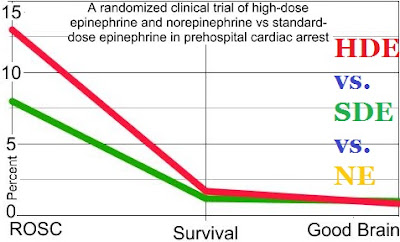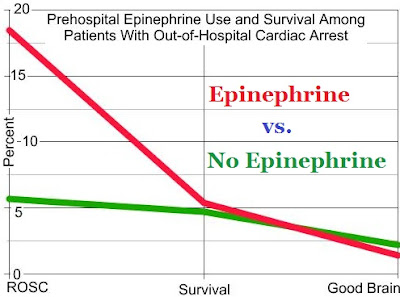
Why do we keep paying attention to studies that only look at ROSC (Return Of Spontaneous Circulation)?
It is true that ROSC is associated with survival to discharge, but as we use treatments to increase ROSC, we only seem to increase the rate of death in the hospital.
We do not increase the rate of survival.
Epinephrine (Adrenaline) produces a lot more ROSC, but appears to produce worse survival.
What is it about epinephrine that causes so many more people to die before they wake up from a coma?
Why do we keep trying to put people in short-term comas, before admitting that they are dead?
Why are we still using a treatment that only causes a brief pulse, when what we want is a treatment that increases the rate of survival to discharge with a working brain?
Even ventilations seem to dramatically decrease survival.

Click on images to make them larger.
Patients had dramatically better survival without ventilations.[1]
Don’t change the subject. What about the epi?
This is comparing three different treatments HDE (High-Dose Epinephrine), SDE (Standard-Dose Epinephrine), and NE (NorEpinephrine). The lines for the HDE and NE are so close to each other, that you may not be able to see the gold line.[2]
Compare that chart of HDE, SDE, and NE with this chart comparing Epinephrine and No Epinephrine.[3]
More ROSC, but fewer survivors.
Shouldn’t the standard of care improve outcomes?
Even the patients who only received the minimum dose – 1 mg – had worse outcomes.[4]
It is possible that there is a subgroup that does benefit from epinephrine – perhaps patients who have ROSC, but remain very bradycardic and lose pulses again. However, there appears to be no attempt to identify any patients who actually may benefit.
This binary, all or nothing, approach is dangerous and nothing new. Five centuries ago Paracelsus gave important advice that we continue to ignore.
All things are poison and nothing is without poison, only the dose permits something not to be poisonous. – Paracelsus.
Dr. David Newman at The NNT reviewed ACLS medications and concluded that there is no evidence of benefit.[5]
The patients who receive epinephrine are those who remain dead long enough to be treated with epinephrine.
Why do we assume that their outcomes would be any worse without epinephrine?
This is the arrogance of ignorance. We don’t know and we don’t want to know.
–
Footnotes:
–
[1] Cardiocerebral resuscitation is associated with improved survival and neurologic outcome from out-of-hospital cardiac arrest in elders.
Mosier J, Itty A, Sanders A, Mohler J, Wendel C, Poulsen J, Shellenberger J, Clark L, Bobrow B.
Acad Emerg Med. 2010 Mar;17(3):269-75.
PMID: 20370759 [PubMed – indexed for MEDLINE]
Free Full Text from Academic Emergency Medicine.
–
[2] A randomized clinical trial of high-dose epinephrine and norepinephrine vs standard-dose epinephrine in prehospital cardiac arrest.
Callaham M, Madsen CD, Barton CW, Saunders CE, Pointer J.
JAMA. 1992 Nov 18;268(19):2667-72.
PMID: 1433686 [PubMed – indexed for MEDLINE]
–
[3] Prehospital epinephrine use and survival among patients with out-of-hospital cardiac arrest.
Hagihara A, Hasegawa M, Abe T, Nagata T, Wakata Y, Miyazaki S.
JAMA. 2012 Mar 21;307(11):1161-8. doi: 10.1001/jama.2012.294.
PMID: 22436956 [PubMed – indexed for MEDLINE]
–
[4] Wide variability in drug use in out-of-hospital cardiac arrest: A report from the resuscitation outcomes consortium.
Glover BM, Brown SP, Morrison L, Davis D, Kudenchuk PJ, Van Ottingham L, Vaillancourt C, Cheskes S, Atkins DL, Dorian P; Resuscitation Outcomes Consortium Investigators.
Resuscitation. 2012 Nov;83(11):1324-30. doi: 10.1016/j.resuscitation.2012.07.008. Epub 2012 Jul 31.
PMID: 22858552 [PubMed – indexed for MEDLINE]
Free Full Text from PubMed Central.
–
[5] NIPPV for CHF Works, ACLS Algorithms Do Not
by David Newman, MD
September 26, 2012
Emergency Physicians Monthly
Article
.






You see this one Tim?
http://www.ncbi.nlm.nih.gov/m/pubmed/22805628/
Adam,
Yes.
That study also demonstrates that the one drug at one dose is right for everything approach has not been well thought out.
.
Go figure, right? I suppose that’s where the old H’s & T’s come in… I have always thought it was crazy that if someone has a ‘heart attack’ we fill their static vasculature with epinephrine, so when they get a pulse back, they now have a chemical pumping through their blood that is known to be lethal in people with acute coronary syndrome. Also, if it constricts the blood vessels of the entire body, wouldn’t that include the cerebral arteries…making cerebral anoxia worse…? “But hey, if we get pulses back, who cares?”, says the cretin medic.
Adam,
My response is here.
.
Has anyone noticed that this data only shows a correlation, not causation? Doesn’t more doses of epi mean a longer period of cardiac arrest than a single dose of epi?
The proponents of epinephrine have been denying that there is any problem and denying that there is any need to demonstrate anything. Pay no attention to the problems. Just trust me.
The problem is that we still do not have valid evidence that epinephrine is safe and effective as a treatment for cardiac arrest.
We need evidence.
It is the responsibility of the sales person to provide evidence that what they are selling is safe.
.